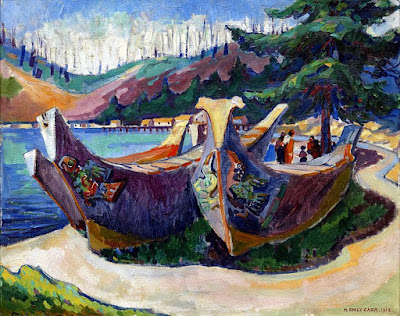 |
| If "cultural appropriation" is really going to be taken seriously, one of the first casualties will have to be Emily Carr (aka 'Klee Wyck'). It was her whole shtick. |
The piece’s hero, Lenore Keeshig-Tobias, is approvingly quoted as saying that “the Canadian cultural industry” has been “stealing … native stories as surely as the missionaries stole our religion and the politicians stole our land and the residential schools stole our language.”
The unspoken premise here, apparently taken to be self-evident, is that learning something new is a matter of losing something.
The solution to her concerns is obvious. Education is bad. Knowledge is bad. Why waste money on it? Stop educating aboriginals. And stop them relentlessly appropriating a foreign culture: ours. Canadian culture, which she has proudly identified herself as not a part of.
And we definitely should not buy and read any stories written by aboriginal writers. It is all a dark plot, evidently, to deprive us of our culture.
Note too the dishonest identification of the opposition as “the Canadian cultural industry.” The usual imaginary fat capitalists with diamond rings on every finger and in silk hats. The reality, of course, is that the targets here are Canadian writers and artists, generally not a terribly solvent lot. People who put up with a great deal of material self-sacrifice, on the whole, in the hopes of enriching the lives of the rest of us.
This is an attack on culture itself.
Peter Kulchyski, a doubtless poverty-stricken professor at the University of Manitoba, adds:
“By simply saying, ‘Oh we love your culture. We’ll have you dance during our Olympic ceremony. We’ll have you say a prayer before our meetings, but we haven’t actually substantively changed the fact that the economy is based on extraction from your lands, and we’re going to continue doing that,’ basically it becomes, at best, a hollow gesture and, at worst … your culture becomes something for sale.”
Right. No problem. No public money then should go to supporting aboriginal cultures. We wouldn’t want to convey the message that it was for sale. Government money should be only for supporting Canadian culture, and if aboriginal culture has declared itself not a part of it, it cannot and should not represent Canada.
 |
| Emily Carr, "War Canoes" |
Problem solved. Everybody happy?
But note too the illegitimate claim here to others’ property. Kulchyski is not talking about mineral extraction on Indian lands, for which the reserve government is always well-compensated. They are even currently compensated, for no good or legal reason, for mining anywhere within hundreds of kilometers of a reserve. Kulchyski is suggesting that this is not enough: all Canadian land still belongs to Indian bands, despite the fact that they sold it long ago. And despite the fact that the bands are merely legal entities, corporations, their current membership bearing only arbitrary relation to the people who once held rights in those lands.
This may not be cultural appropriation, but it is certainly illegitimate appropriation of what belongs to others.
As to culture not being a thing for sale, excellent. From now on all books written by self-identified “aboriginal” authors, and all painting or sculpture by aboriginal artists, is free for the taking. It goes without saying, I guess, that no aboriginal person cares about money.
 |
| Emily Carr, "Kitwancool" |
No problem.
So what’s the beef about “cultural appropriation,” then? If anyone paid for it, that would be an insult, after all.
Keeshig-Tobias’s final word is “Your imagination comes right up to my nose, and if it goes any further, then I push back.”
An interesting use of the legal adage, ““Your right to swing your arms ends just where the other man’s nose begins.”
And telling here. Nobody’s imagination can possibly connect, after all, with Keeshig-Tobias’s nose. Unless you reject the entire point of the legal principle, she is in the wrong.
Rex Murphy, thankfully, has weighed in against this attempt at cultural larceny. Unfortunately, his defense is marred by an unfortunate ignorance of the culture he defends. This, by the way, from a Rhodes Scholar who studied at Oxford. It illustrates how badly we have neglected it.
He points out, rightly, that empirical science is a European invention, so that any aboriginal who avails himself of its benefits while complaining about appropriation of his own culture is a perfect hypocrite. But he confuses it by supposing everyone is Italian (and not bothering to check, either):
“Were this not so, the Italians, whose illuminati Galileo, Copernicus, Tyco Brahe, Kepler did so much to beget modern science, would have a case against every PBS special on the Cosmos for appropriating their science.”
There is only one Italian on that list.
Then he seems to think that Dante is not Christian:
“Virgil fed on Homer, Dante on Homer and Virgil. Milton, saturated with a knowledge of all three, with Paradise Lost re-imagined the epic in a Christian context.”
Ouch. Such an idea would not be possible to anyone who had the slightest knowledge of Dante--even as much as the titles of his major works.
 |
| Dante's Inferno |
We need better cultural education in this nation. We need more cultural appropriation on all sides. Obviously.
My own final word: who here is guilty of an illegitimate “cultural appropriation”? Only, and dramatically, those “aboriginal” artists who have the gall and the avarice to try to appropriate to themselves an entire culture they had nothing to do with: all the works and inventions of aboriginal artists and thinkers of the past.
Any honourable person must stand up and resist. It is, truly, a crime against humanity.












No comments:
Post a Comment